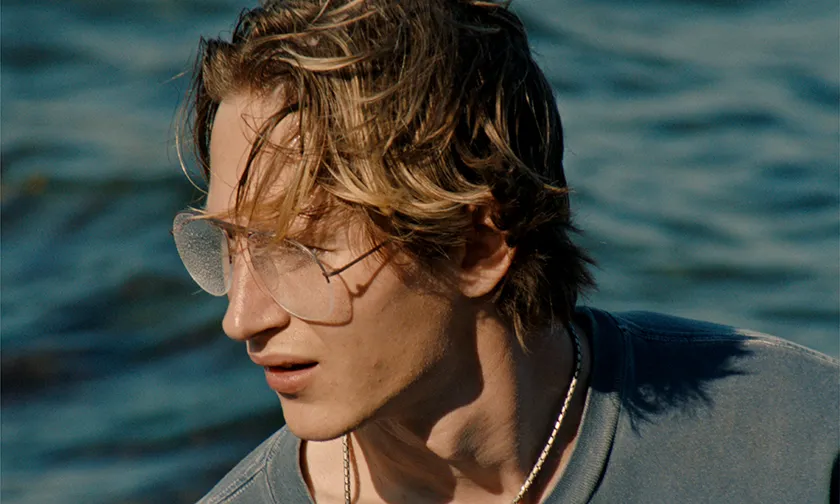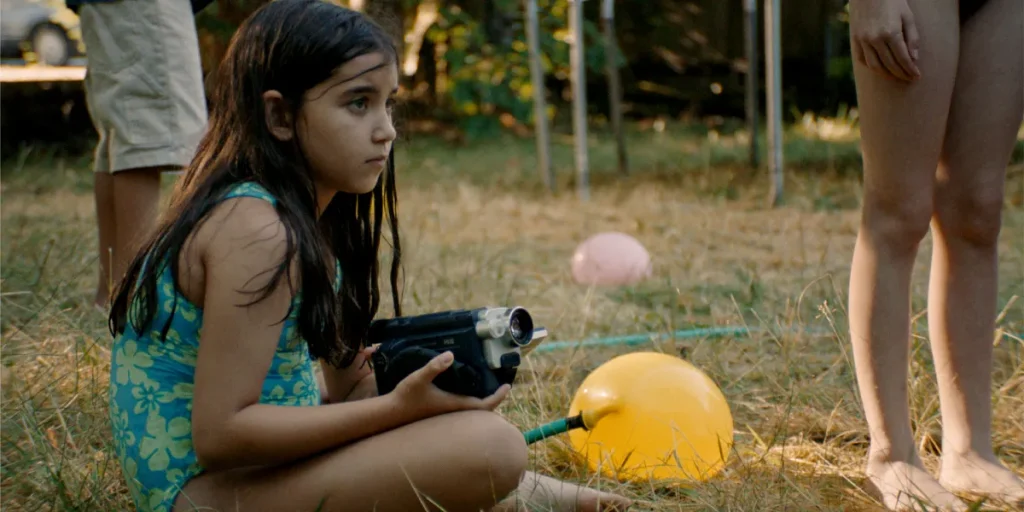Sophy Romvari’s magnificent feature debut Blue Heron takes a brilliant approach in looking at trauma, memory and cinema’s ability to process both.
Director: Sophy Romvari
Genre: Drama
Run Time: 90′
BFI London Film Festival Screening: October 14-15, 2025
U.S. Release Date: TBA
U.K. Release Date: TBA
Few filmmakers build a following before their first feature film. Sophy Romvari is an exception. The Canadian-Hungarian filmmaker garnered that reputation with a series of short films, which were met with such prestige that Criterion put them together in a collection for its streaming service. Some of them, including Romvari’s breakthrough Still Processing, were docu-fiction hybrids that utilised some of her family history.
Still Processing in particular saw her tackle the loss of two of her brothers by sifting through old photos to uncover lost memories. That personal edge is reapplied by Romvari for her debut feature Blue Heron, which also sees her self-reflexively use cinema to tackle the medium’s ability to process complicated feelings. It is a distinctive approach that leads to a very special film.
It’s the late 1990s, and a family of six moves to their new home on the idyllic Vancouver Island. They consist of Hungarian immigrant parents (the mother played by Iringó Réti, the father by On Falling’s Ádám Tompa), three sons and daughter Sasha (Eylul Guven). But this fresh start has complications, and Sasha sometimes hears hushed conversations between her parents that slip into their native tongue. It turns out that they are concerned about the eldest son Jeremy (Edik Beddoes). If he’s not quiet and withdrawn, drawing fantasy maps, then he is volatile and erratic. And as Jeremy’s moments of acting out become more and more worrying, Mom and Dad struggle to cope. Years later, an adult Sasha (Amy Zimmer, Problemista) is a filmmaker trying to understand what happened.
“It’s true I spent most of my life being angry at him”, Sasha’s narration admits at the start before she thanks him for the memories. “They’re all I have now.” True to that primary theme of memory, Blue Heron is a film full of meticulously gathered minutiae that could prompt recollections of the past. Panoramic landscapes and summer fun outside. Scenes where Sasha uses the Paint program on her dad’s PC before making röstis with her mother. That attention to detail carries over to the sound design, which includes rustling wind, trampoline springs – or muffled thumping from Jeremy when he ends up on the roof.

His outbursts are proving to be both uncontrollable. When he disappears from a family trip to the beach, he is found miles away at a gas station. Another time, he is brought home in handcuffs after shoplifting (kleptomania being another of his traits). Each occasion, Jeremy is blasé about what he has done. The question then becomes how to help Jeremy, if he can be (or wants to be) helped at all. Child psychologists and Social Services are at a loss regarding what to do. And it leads to a powerlessness from parents and an observant Sasha who can only watch, this familial crisis rendered (mostly) through a child’s gaze.
Comparisons will and have already been made to Charlotte Wells’ Aftersun, which was also a debut set in the ‘90s, with timeline shifts and focuses on memory amidst a dark past. However, Romvari successfully crafts her own spin on those devices with the help of Maya Bankovic’s exquisite camerawork and blocking. There are multiple formats used, whether it is footage from Sasha’s dad’s camcorder or photos taken with a camera he later develops the film from in a “time warp” moment. Yet there are also times where the film puts us at a distance, reflecting shots through windows or mirrors that split the parents into two visages. Add the use of long lenses, and the sense of helplessness is only intensified.
At first glance, Blue Heron seems to be a conventional yet nonetheless intriguing drama about family and mental health. That is aided by the enveloping, close-to-suffocating tension generated from Jeremy’s episodes, like a water balloon being filled with water, almost ready to burst. Then the second half enters more unpredictable and thrilling territory. Without spoiling what happens, there is a switch that might be destabilising to some audiences. But it is a brilliant choice from Romvari as she blurs documentary and fiction, past and present, whilst inserting some autofictional elements and avoiding total explanation. It helps that Zimmer shines in this section, bringing great empathy and regret to the older Sasha (though every performance is transfixing, particularly those from Réti and newcomer Guven).
Blue Heron is a magnificent debut about trauma and memory, the ability film gives us to work through those troubles, but also, as Romvari said in her Locarno director’s statement, “the imperfections of depicting memory in cinema.” For Sasha, trying to find answers and catharsis leads to fragmentation, with the shattered and broken states of our main characters (Jeremy and his parents especially) mirrored by the fragmented form Romvari takes for her narrative.
“The older I get, the more I feel like I never even knew him at all,” Sasha says at one point in a line that feels critical. Yet at the same time, there are glimmers of a sibling bond between her younger self and Jeremy, told in glancing looks. If a clear picture cannot be formed, then those looks will form at least part of the memory that Sasha will always carry, as shown by an impactful climax soundtracked to Brian Eno’s ‘An Ending (Ascent)’. By that point, Blue Heron has already confirmed that Romvari is an ascendant talent.
Blue Heron: Movie Plot & Recap
Synopsis:
In the late 1990s, Sasha moves to Vancouver Island with her family, who must contend with the behaviour of her elder brother Jeremy. Years later, an adult Sasha tries to make sense of what happened.
Pros:
- A magnificent debut from Romvari with a second-half switch that blurs documentary and fiction together.
- Maya Bankovic’s camerawork is exquisite, often putting us at a distance from events.
- Every performance is transfixing (Zimmer, Réti and Guven in particular).
Cons:
- The mid-film switch Romvari makes might be destabilising to some audiences.
Blue Heron was screened at the BFI London Film Festival on 14-15 October, 2025.

